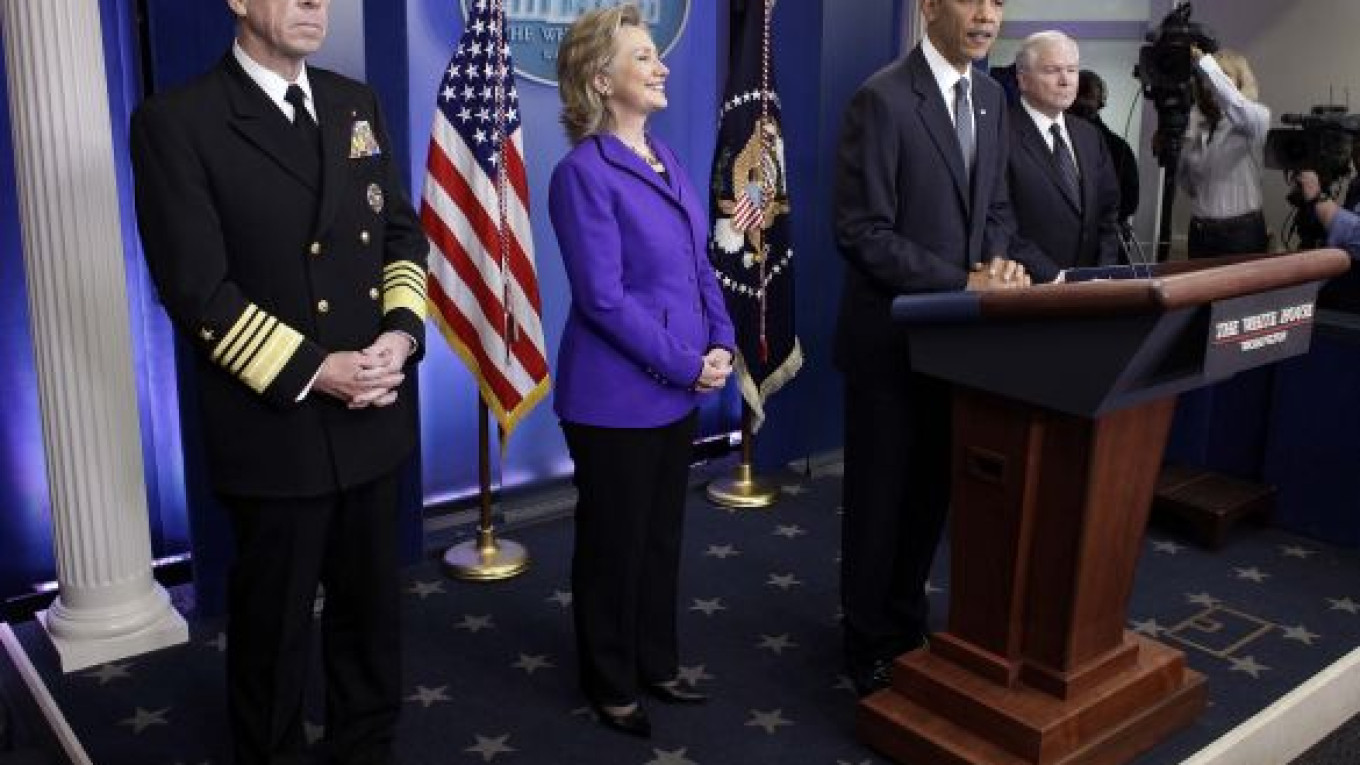WASHINGTON — Presidents Barack Obama and Dmitry Medvedev sealed a landmark arms-control treaty on Friday to slash their countries' nuclear arsenals by a third. They will sign it on April 8 in Prague.
After months of deadlock and delay, a breakthrough deal on a replacement for the Cold War-era Strategic Arms Reduction Treaty marked Obama's most significant foreign policy achievement since taking office and also bolsters his effort to "reset" ties with Moscow.
Presidents Barack Obama and Dmitry Medvedev sealed an agreement Friday for a landmark nuclear arms reduction treaty. Here are details about the treaty, why it is important and the path to its ratification in the United States:
Reset in Relations
The new treaty is a successor to the 1991 Strategic Arms Reduction Treaty, which expired in December. But perhaps more important, it is seen as a major step to improving Russian-U.S. relations after years of tension that peaked following Russia's war with U.S.-supported Georgia in 2008.
Obama and Medvedev plan to sign the treaty April 8 in Prague, where the U.S. president last year made a major speech outlining his vision for eventually ridding the world of nuclear weapons.
Cuts Deployed Warheads
The new treaty reduces the numbers of deployed warheads from previously agreed levels, but it still leaves Russia and the United States with enough nuclear weapons to easily assure their mutual annihilation.
* Warheads: Limits the number of operationally deployed nuclear warheads to 1,550, which is down nearly two-thirds from the original START treaty and is 30% lower than the deployed strategic warhead limit of the 2002 Moscow Treaty.
* Launchers: Limits to 800 the number of deployed and nondeployed intercontinental ballistic missile (ICBM) launchers submarine-launched ballistic missile (SLBM) launchers, and heavy bombers equipped for nuclear armaments.
* Missiles: Limits the number of ICBMs, SLBMs and deployed heavy bombers equipped for nuclear armaments to 700.
Ratification
The treaty still must be ratified by a two-thirds majority of the U.S. Senate. The Obama administration says it does not expect opposition because the treaty does not put limits on U.S. missile defense plans. Analysts believe that opposition Republicans could seize upon the treaty's ratification process as a chance to brand Obama as soft on defense.
— Reuters
Obama and Medvedev put the finishing touches on the historic accord during a phone call, committing the world's biggest nuclear powers to deep weapons cuts.
"I'm pleased to announce that after a year of intense negotiations, the United States and Russia have agreed to the most comprehensive arms-control agreement in nearly two decades," Obama told reporters.
But he could still face an uphill struggle for ratification this year by the U.S. Senate.
In Russia, the Kremlin hailed the agreement — which also must be approved by Russian lawmakers — as reflecting a "balance of the interests of both countries."
Foreign Minister Sergei Lavrov made clear, however, that Russia reserved the right to suspend any strategic arms cuts if it felt threatened by future U.S. deployment of a proposed Europe-based missile defense system that Moscow bitterly opposes.
The agreement replaces a 1991 pact that expired in December. Each side would have seven years after the treaty takes effect to reduce stockpiles of their most dangerous weapons — those already deployed — to 1,550 from the 2,200 now allowed and also cut their numbers of launchers in half.
Secretary of State Hillary Clinton said the new pact sends a message to Iran and North Korea, both locked in nuclear standoffs with the West, of a commitment to thwart nuclear proliferation.
"With this agreement, the United States and Russia — the two largest nuclear powers in the world — also send a clear signal that we intend to lead," Obama said.
Signaling prospects for cuts by other nuclear powers, British Foreign Secretary David Miliband said: "As soon as it becomes useful to do so, the U.K. stands ready to include our nuclear arsenal in a future multilateral disarmament process."
German Foreign Minister Guido Westerwelle called it "a milestone that will promote overall nuclear disarmament," and European Commission President Jose Manuel Barroso congratulated Obama and Medvedev on "this historic agreement."
The treaty adds another chapter in a quarter century of efforts to make the world safer through nuclear arms control, after a 1986 summit between U.S. President Ronald Reagan and Soviet President Mikhail Gorbachev laid the groundwork.
Obama and Medvedev will sign the New Strategic Arms Reduction Treaty in Prague, capital of the Czech Republic, a former Soviet satellite now in NATO.
The April 8 meeting will be close to the anniversary of Obama's speech in Prague offering his vision for eventually ridding the world of nuclear weapons and should help build momentum for a nuclear security summit that he will host in Washington on April 12 and 13.
The treaty does not impose limits on U.S. development of a missile defense system in Europe, which had been a major sticking point in negotiations. Washington insists that such an anti-missile shield would be aimed at Iran, not at Russia.
"Missile defense is not constrained by this treaty," U.S. Defense Secretary Robert Gates said.
But Lavrov said either side has the right to stop reducing offensive nuclear weapons if the other beefs up its missile defenses — a warning of consequences if Moscow sees a threat to its security.
Obama said the new treaty would help Washington and Moscow put behind them the "darkest days of the Cold War."
"It cuts, by about a third, the nuclear weapons that the United States and Russia will deploy," Obama said. "It significantly reduces missiles and launchers. It puts in place a strong and effective verification regime.
"And it maintains the flexibility that we need to protect and advance our national security, and to guarantee our unwavering commitment to the security of our allies."


